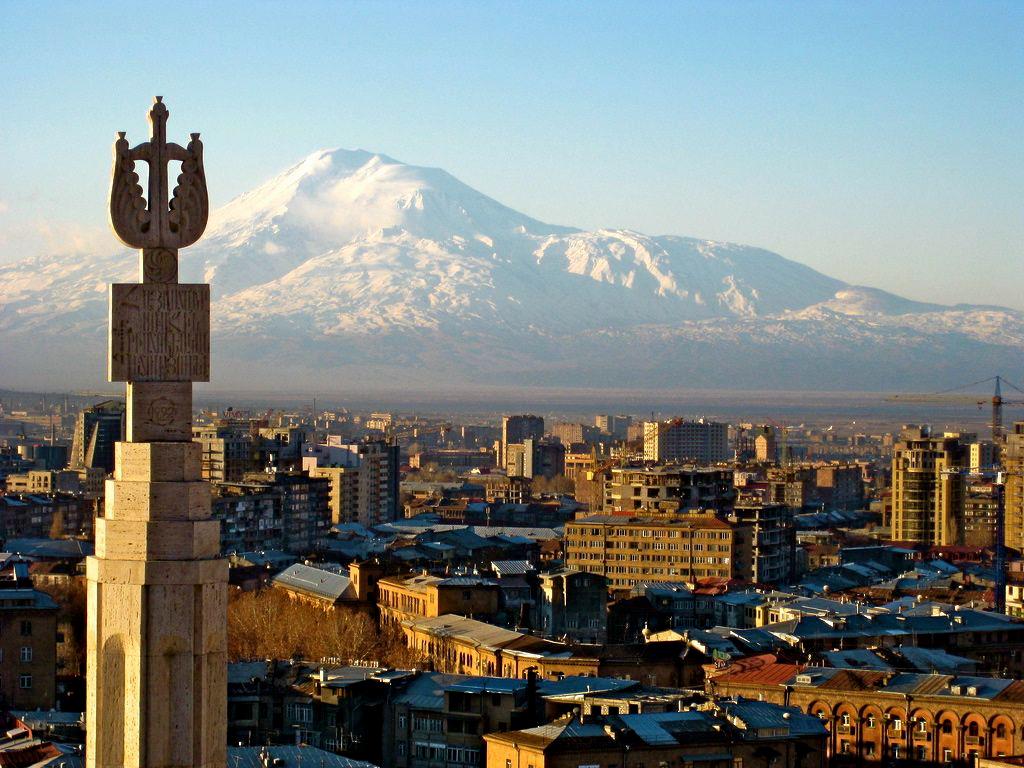By: Zara Hovasapyan
On Monday, I had the pleasure of hearing Chris Bohjalian speak at the two events hosted by the ANCA to promote his new book, The Sandcastle Girls. In one of his speeches, he described Mount Ararat as “the geographic soul of Armenia.” Ararat has always been a symbol of Armenia, a representation of what was and will be Armenia, but the words “geographic soul” really resonated within me.
I began to ponder what “the soul of Armenia” is. It is not speaking the language, eating the food, or learning the history, as these attributes can all be taught and adopted by anyone. The Armenian soul is beyond substance. It is something intangible.
When I was younger, my grandfather taught me two Armenian poems to memorize. As a professor of Armenian literature, he passed on his legacy by having my brother and me recite Ես իմ անուշ Հայաստանի (“My Sweet Armenia”) by Yeghishe Charenc and ԽՈՍՔ ԻՄ ՈՐԴՈՒՆ (“Message to my Son”) by Silva Kaputikyan. To him, I am most grateful for cementing, in my memory, the wise words of two patriotic poets who understood the essence of being Armenian. During my contemplation of the meaning of the Armenian soul, the lyrics of Charenc came to mind.
Despite a promising title, “Yes Im Anush Hayastani” has a very nostalgic and glum tone. Evoking thoughts of Armenian history and the struggle of our people, the poem mourns the losses of Armenia and cherishes its legacy. But, most of all, Charenc eloquently encapsulates the fundamental quality of being Armenian in the last line of his poem. He writes, “Ինչպես անհաս փառքի ճամփա՝ ես իմ Մասիս սա՛րն եմ սիրում,” (“Like a path to an unattainable glory, I love my Masis Sar”). Such strong words: like a path to an unattainable glory. Yet, there is no pessimism. To me, his words are the definition of Hye Daht (the Armenian Cause). What we do today, in the Diaspora or in Armenia, is a journey to attaining the glory Charenc is referring to. Though he tells us glory is unattainable, the effect of the previous stanzas of his masterpiece that incite patriotism and a desire to preserve what is Armenian urges the reader to embark on that journey. Intangible by its nature, glory can represent a myriad of prizes. Possessively claiming Ararat as his own, the last words of Charenc’s poem,“I love my Masis Sar,” tell us what the prize is. As Chris Bohjalian said, the prize is the soul of Armenia.
Attaining Genocide recognition would be life-changing; fulfilling the dream of an independent Artsakh would be joyous; being able to step foot on Western Armenian soil and know that it is in the hands of the right people again would heal the wounds of millions of hearts. However, it is not what we have accomplished, or what we have today in our culture that makes us Armenian, it is the journey to attain the unattainable that molds us. Learning Armenian, eating Armenian food, reading Armenian history is available to everyone. However, refusing to stray from the strenuous path to obtaining the unobtainable, can be understood only by those who carry the Armenian soul within them.
And any day in Yerevan, the heart of our country, you can look from countless vistas and have a panoramic view of Mount Ararat and be reminded of who you are. The soul of Armenia is the lengths that we will go to attain the glory that Charenc knows so well about.

For further reading:
Ես իմ անուշ Հայաստանի
Ես իմ անուշ Հայաստանի արևահամ բառն (բարն) եմ սիրում,
Մեր հին սազի ողբանվագ, լացակումած լարն եմ սիրում,
Արնանման ծաղիկների ու վարդերի բույրը վառման,
Ու նաիրյան աղջիկների հեզաճկուն պա՛րն եմ սիրում։
Սիրում եմ մեր երկինքը մուգ, ջրերը ջինջ, լիճը լուսե,
Արևն ամռան ու ձմեռվա վիշապաձայն բուքը վսեմ,
Մթում կորած խրճիթների անհյուրընկալ պատերը սև,
Ու հնամյա քաղաքների հազարամյա քա՛րն եմ սիրում։
Ո՛ւր էլ լինեմ – չե՛մ մոռանա ես ողբաձայն երգերը մեր,
Չե՜մ մոռանա աղոթք դարձած երկաթագիր գրքերը մեր,
Ինչքան էլ սո՜ւր սիրտս խոցեն արյունաքամ վերքերը մեր –
Էլի՛ ես որբ ու արնավառ իմ Հայաստան – յա՛րն եմ սիրում։
Իմ կարոտած սրտի համար ո՛չ մի ուրիշ հեքիաթ չկա․
Նարեկացու, Քուչակի պես լուսապսակ ճակատ չկա․
Աշխա՛րհ անցի՛ր, Արարատի նման ճերմակ գագաթ չկա․
Ինչպես անհաս փառքի ճամփա՝ ես իմ Մասիս սա՛րն եմ սիրում։